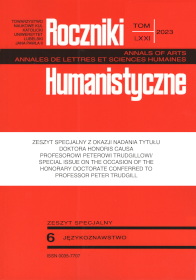Testing Frenchification: A Sociolinguistic Analysis of French Loan Morphology in Seventeenth- and Eighteenth-Century Dutch
Testing Frenchification: A Sociolinguistic Analysis of French Loan Morphology in Seventeenth- and Eighteenth-Century Dutch
Author(s): Gijsbert Rutten, Rik VostersSubject(s): Language and Literature Studies, Applied Linguistics, Sociolinguistics
Published by: Towarzystwo Naukowe KUL & Katolicki Uniwersytet Lubelski Jana Pawła II
Keywords: 10.18290/rh237106.111s
Summary/Abstract: There is a long history of social, cultural and political contact between the Dutch and French language areas, which has also resulted in language contact. In the Dutch language area, the cultural and linguistic contact situation has resulted in an anti-French discourse of alleged Frenchification from the sixteenth century onwards. The peak of influence from French is traditionally located in the eighteenth century. However, corpus-based research of the actual influence of French on Dutch in the Early and Late Modern periods is still scarce. We investigate the use of 31 French loan suffixes (e.g. the verbal suffix -eren, nominal suffixes such as -age and -teit, and adjectival suffixes such as -aal) in the Letters as Loot Corpus, which is a socially stratified corpus of private and business letters from the seventeenth and eighteenth centuries, written by men and women from various regions in the northern Low Countries. A regression analysis shows that the overall distribution of French loan suffixes is quite similar in the two periods, except for the capital Amsterdam, where there is a significant increase in the eighteenth century. Further significant effects are found for men and for the higher social ranks, and for business or mixed letters (as opposed to purely private letters). The results suggest that French-origin items entered the language of the northern Low Countries as relatively formal or conceptually written forms, mainly adopted by upper (middle) class men from the cosmopolitan city of Amsterdam.
Journal: Roczniki Humanistyczne
- Issue Year: 71/2023
- Issue No: 6S
- Page Range: 227-250
- Page Count: 24
- Language: English

